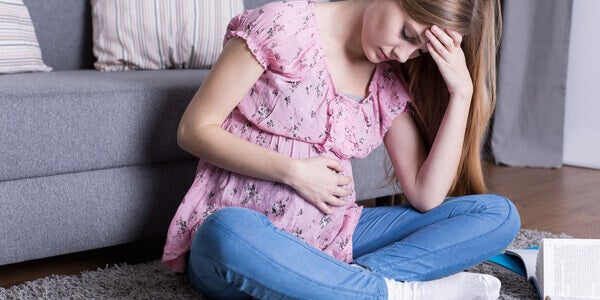The most common thing when a woman is pregnant is that she gains 9 to 14 kilograms. While this number varies, it is normal that after the first trimester the mother earns a pound and a half each month. However, some women develop pregorexia, a condition known as anorexia in pregnant women, that overrides this standard.
Loss or lack of weight gain, as well as lack of essential nutrients, prevent the fetus from developing properly, for this reason, and although they occur in a small number of cases, the impact of gestations can be very severe for both mother and mother. the fetus.
- This anglilicism has its origins in pregnancy and anorexia.
- It is an eating disorder that affects pregnant women who develop an irrational fear of gaining weight during pregnancy.
- Insist so much on the desire to maintain body weight that they do all kinds of actions to stay in shape.
They choose to restrict to the maximum what they eat after low-calorie and restrictive diets, avoid foods high in carbohydrates and fats and deprive themselves of any kind of ‘desire’ characteristic of their condition. They also perform excessive and obsessive physical activity, in addition, they use purging practices after stealing the refrigerator, forcing them to vomit and even to use laxatives What a danger!
Pregnant women may develop pre-goria without ever having an eating disorder, but this is not common, most commonly you have had such a disorder, such as anorexia or bulimia, at another time in their lives. Having suffered in the past, despite the increased risk, does not mean that the pregnant woman will develop a disorder during the months of pregnancy.
The causes of this disorder originate from psychological, biological and interpersonal factors that predispose women to develop such a disorder.
The main verbal indicators that pregnant women suffer from this disorder are: avoid talking about pregnancy, denying their problem and rejecting both their condition and their own changes, all this is a result of their feeling of fear and anxiety about gaining weight. they think if they don’t talk about it, it won’t exist.
Physically, the small increase or even loss of weight during pregnancy is noticeable, which is most evident in the second trimester, since it is the time when the body changes are most visible.
In addition, low-calorie diets, excessive exercise, and purging practices are associated with dizziness or headaches and excessive fatigue, leading to difficulty concentrating and trouble sleeping, all of these symptoms not only increase the chance of a risky pregnancy, but can also cause problems during childbirth and hinder the child’s subsequent development.
The impacts of this disorder are, on the one hand, those arising from lack of food intake: malnutrition, anemia, bradycardia, arrhythmias, high blood pressure, hair loss or very dry and cracked skin. You have to add the consequences they have for pregnancy.
Decreased essential minerals due to insufficient intake can lead to bone descaling as well as low breast milk production, making it difficult for the baby to be adequate and satisfying once born.
On the other hand, a woman may have a smaller volume of amniotic fluid, a vital fluid for the fetus, which surrounds and protects her from external injuries and possible blows, and placental detachment can occur. This condition is very serious, especially if it occurs in the third trimester.
The mother’s diet is crucial for the development of the fetus, so the consequences that this disorder causes can be very dangerous, pre-goria increase the possibility of complications during childbirth, some of them can be respiratory failure, low weight or very low weight. Apgar test values may also result in preterm birth (before 37 weeks of pregnancy), fetal malformations, neurological disorders, ADHD, or intellectual disability.
If the mother has suffered severe placental detachment, it is certain that the baby will have trouble growing. Pregorexia also increases the risk of the baby dying in the first month of life, as well as a lifeless birth.
The way a pregnant woman eats and what she eats is just as important during pregnancy, eating more food is different from increasing her quality, so the pregnant woman should pay attention to her diet, but not obsess over her. it’s detected, the better. Its consequences are more likely to cause irreversible harm to women and children.
Because it is a psychiatric illness, it is necessary to have a multidisciplinary and specialized team to apply appropriate treatment, for example, a psychiatrist, psychologist, obstetrician and nutritionist can help outline a complex and comprehensive approach to the case.
It is advisable to create a relaxed and warm atmosphere during meals, as well as normalize meal schedules, it is recommended that the family does not force or insist on the amount of food that the patient should eat, this can be very dangerous.
Obesity and extreme thinness can lead to a risky pregnancy, so it is preferable that eating during this period is balanced and varied, in addition it is advisable to exercise regularly, especially yoga, pilates or walking, aesthetics should never be a priority. If health is at stake, let alone your child’s health!

